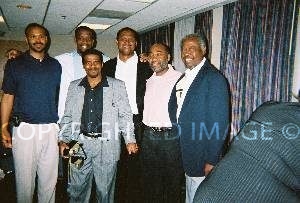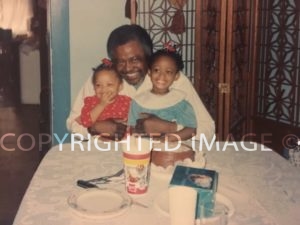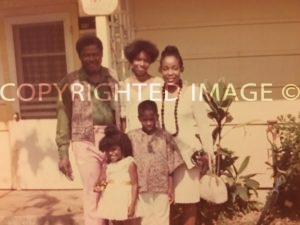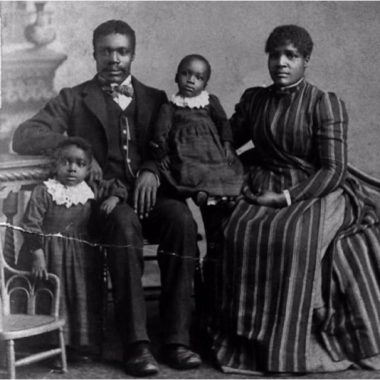So who, really, is that man that you call your father? Perhaps he may be a great person with whom you have a wonderful relationship. Maybe he has created fond memories with you and the rest of your family, or not! He may have a great family pedigree on paper, but who is he from a genetic genealogy perspective? I am going to share with you my experience with Y-DNA testing , hopefully providing you with some strategies and things to consider before Y-DNA testing the men in your life.
As we approach the celebration of Father’s Day on Sunday, June 18 this year, some may be seeking more information about their father or other men in their family tree. In an earlier post I explained what haplogroups assignments are and how they are used.
Y-DNA Review
- Knowing ones haplogroup assignments can be helpful in revealing relationships which may not be obvious via traditional genealogy research.
- Males have both an X and a Y chromosome and are assigned corresponding maternal and paternal haplogroups. Females have two X chromosomes and are assigned a single maternal haplogroup.
- If you are female, you will not be assigned a paternal halplogroup, you must test your father or a male who shares your paternal line -your brother, grandfather, uncle, cousin. They would likely have the same surname as your father. Any generation is fine.
- Companies that provide haplogroup assignments will provide information that ties the assignment to a region and genetic population. These companies include include FTDNA (Family Tree DNA) , 23andme, and African Ancestry. As of this posting, AncestryDNA, and MyheritageDNA do not.
- Family Tree DNA will allow you to do further testing on maternal and paternal lines in order to gain more information about the associated families. For paternal haplogroup testing, FTDNA offers the following tests Y-37, Y-67, Y-111 . They also have surname projects.
- African Ancestry offers a PatriClan Test Kit. If your Y-chromosome markers have African ancestry, they can tell you what present-day country(ies) in Africa that they share ancestry with.
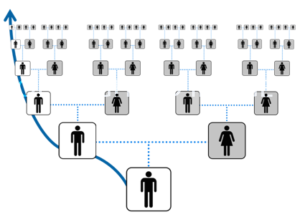
My Story
I have Y-DNA tested two males on my maternal side. In both cases I used FTDNA’s Y-37 test. I am only going to talk about one in this blog post. A 23andme autosomal test taken earlier by this family member with the last name NELSON had revealed a European haplogroup assignment. Although my family identifies as African American , this did not come as a shock because we understood that the number of African American males that have European Haplogroups is around 30%-40%. So I wanted more information about this line because the 23andme produced only a few Nelson matches that did not appear to be connected through our Nelson branch. Although, there were other matches with the same paternal haplogroup, I could not discern that they were matching through this Nelson branch either. So in the hopes of finding lots of other Nelsons with who we shared a common ancestor, I had this male family member take a YDNA-37 test via FTDNA back in 2012. Now mind you I was novice at both Genealogy and Genetic Genealogy but I was part of a robust community of family researchers and we were all learning together along with those who were further along in the journey.
The Big Reveal
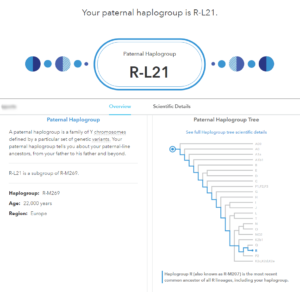
Weeks passed and I had grand visions of this great big Nelson Family reunion , replete with embraces, foods, family stories, etc., in Virginia of course because that’s where I thought they might be from. Finally the big day arrived and the results were in . The haplogroup that was initially assigned at 23andme was R-L21 , a subgroup of R-M269 was confirmed at FTDNA. There were only seven matches, all with the same surname- LEWIS except one ,an adoptee, and NO NELSONS ! Again while it was not a total shock, it sort of caught me off guard and I wondered if the tests were mixed up. In my head I understood the history of surnames and those who were enslaved but i was still caught off guard as I did not know anything about this family whose progenitor was Welsh. I was right about one thing, that they were from colonial Virginia. So I joined the FTDNA Lewis surname project and associated Facebook groups with the hopes of finding out more . I actually mourned not being a “bonefide” biological Nelson, whatever that meant! I was consoled by members of the genealogy community . Since the initial test in 2012, we have acquired two more Lewis matches. Bringing it to a total of nine, which the experts have told me provides ample evidence of kinship. With this Y-DNA information, I have been able to narrow my search for this non-paternity event (NPE) to several families within this particular Lewis line. I also realized that the “Nelson” surname, at the very least , might provide a clue to the identity of someone or some location in my family’s history and may provide a reason for why this Nelson surname was adopted.
The Family Share
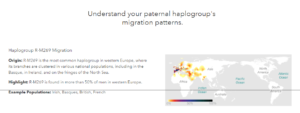
I will warn you to be prepared when sharing this information where the DNA evidence does not match the surname, especially with family. You may receive a cool reception, lots of side eye, and rebukes from your family members. In my case there have been at least five generations of Nelsons dating back to the mid 1800’s. Of course we are attached to the Nelson surname ! It’s all we have, even though we have no idea how we acquired it! My experience with revealing new DNA findings with family is this- that not everyone is going to believe the information, especially if no other family has tested and you have no research to support it. Even with all of that they still may not accept you findings! I would encourage you to mainly share and seek the support of those who would encourage your exploration and research. I would caution you not to make any major pronouncements or change the name of your family reunion. If revealing your new Y-DNA findings at a family reunion, I would emphasize the fact that research is ongoing and that you are still gathering information. If you have substantial evidence then by all means get permission to present it. In my opinion, there will always be family naysayers, usually the ones who have done little to no family research and who are not trying to understand genetic genealogy.
Conclusion
In closing, I would add that depending on what you are trying to find out about the men in your family tree, this may dictate your strategy for DNA testing. In my case, I wanted to know more about a particular paternal line once I found out what the paternal haplogroup via an autosomal test, I took it a step further and had the male family member take the Y-DNA37 test on FTDNA. Now you can order a combination autosomal (Family Finder) plus Y-DNA from FTDNA . At that time, that option was not available.
This Father’s Day will be the first without my father. However he will still be honored by my family members and I. Thanks for stopping by and reading my blog post.
Happy Father’s Day and consider a gift of DNA testing for the father’s in your life! Be sure to subscribe to receive my blog post notifications and and as a thank you, you will receive a resource with more information on DNA testing for genealogy.
